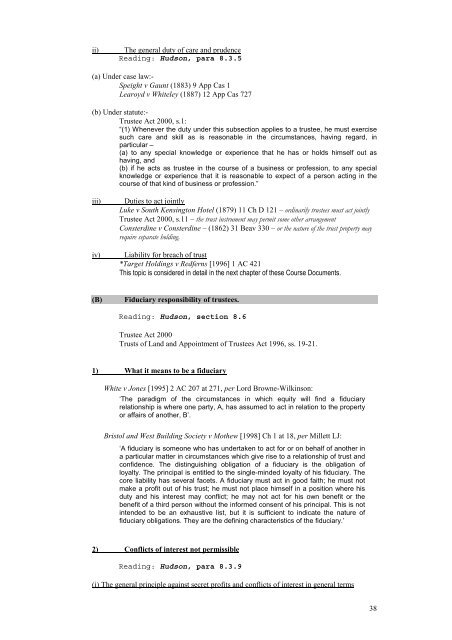Soton Equity and Trusts - alastairhudson.com
Soton Equity and Trusts - alastairhudson.com
Soton Equity and Trusts - alastairhudson.com
You also want an ePaper? Increase the reach of your titles
YUMPU automatically turns print PDFs into web optimized ePapers that Google loves.
ii)<br />
The general duty of care <strong>and</strong> prudence<br />
Reading: Hudson, para 8.3.5<br />
(a) Under case law:-<br />
Speight v Gaunt (1883) 9 App Cas 1<br />
Learoyd v Whiteley (1887) 12 App Cas 727<br />
(b) Under statute:-<br />
Trustee Act 2000, s.1:<br />
“(1) Whenever the duty under this subsection applies to a trustee, he must exercise<br />
such care <strong>and</strong> skill as is reasonable in the circumstances, having regard, in<br />
particular –<br />
(a) to any special knowledge or experience that he has or holds himself out as<br />
having, <strong>and</strong><br />
(b) if he acts as trustee in the course of a business or profession, to any special<br />
knowledge or experience that it is reasonable to expect of a person acting in the<br />
course of that kind of business or profession.”<br />
iii)<br />
iv)<br />
Duties to act jointly<br />
Luke v South Kensington Hotel (1879) 11 Ch D 121 – ordinarily trustees must act jointly<br />
Trustee Act 2000, s.11 – the trust instrument may permit some other arrangement<br />
Consterdine v Consterdine – (1862) 31 Beav 330 – or the nature of the trust property may<br />
require separate holding.<br />
Liability for breach of trust<br />
*Target Holdings v Redferns [1996] 1 AC 421<br />
This topic is considered in detail in the next chapter of these Course Documents.<br />
(B)<br />
Fiduciary responsibility of trustees.<br />
Reading: Hudson, section 8.6<br />
Trustee Act 2000<br />
<strong>Trusts</strong> of L<strong>and</strong> <strong>and</strong> Appointment of Trustees Act 1996, ss. 19-21.<br />
1) What it means to be a fiduciary<br />
White v Jones [1995] 2 AC 207 at 271, per Lord Browne-Wilkinson:<br />
‘The paradigm of the circumstances in which equity will find a fiduciary<br />
relationship is where one party, A, has assumed to act in relation to the property<br />
or affairs of another, B’.<br />
Bristol <strong>and</strong> West Building Society v Mothew [1998] Ch 1 at 18, per Millett LJ:<br />
‘A fiduciary is someone who has undertaken to act for or on behalf of another in<br />
a particular matter in circumstances which give rise to a relationship of trust <strong>and</strong><br />
confidence. The distinguishing obligation of a fiduciary is the obligation of<br />
loyalty. The principal is entitled to the single-minded loyalty of his fiduciary. The<br />
core liability has several facets. A fiduciary must act in good faith; he must not<br />
make a profit out of his trust; he must not place himself in a position where his<br />
duty <strong>and</strong> his interest may conflict; he may not act for his own benefit or the<br />
benefit of a third person without the informed consent of his principal. This is not<br />
intended to be an exhaustive list, but it is sufficient to indicate the nature of<br />
fiduciary obligations. They are the defining characteristics of the fiduciary.’<br />
2) Conflicts of interest not permissible<br />
Reading: Hudson, para 8.3.9<br />
(i) The general principle against secret profits <strong>and</strong> conflicts of interest in general terms<br />
38













